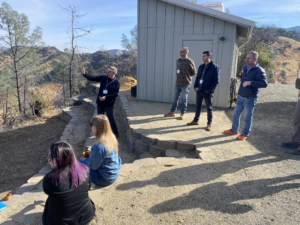Advocacy
Biological field stations and marine labs are governed from many angles: campus administrators, surrounding land managers, and local, regional, and national governments. Field stations as institutions of research and education depend heavily on government funding and support. Thus, how biological field stations advocate and position themselves in the larger regulatory and governmental landscape have important consequences for research flexibility and sustainable operations.

Legislative advocacy visit to the capitol. L to R: Katherine Charton, PhD Candidate in Biology, University of Wisconsin (Madison, WI); Dr. Lauren Orton, Professor of Biology at Sauk Valley Community College (Dixon, IL); Dr. Rebecca Kauten, Scientist in Residence for Iowa Lakeside Laboratory (Milford, IA)
In the United States, the “CHIPS and Science Act of 2022” outlined how the National Science Foundation must support field stations and marine laboratories. Building off this federal recognition of field station’s value, the OBFS Outreach & Communications Committee helps empowers OBFS members to engage and advocate for their own field station, and all field stations across the globe. Some opportunities and resources for OBFS members include the following:
- AIBS Congressional Visit Day: OBFS collaborates with the American Institute of Biological Sciences (AIBS) annually to sponsor a few OBFS members to an in-person training and engagement opportunity on Capitol Hill in Washington D.C. The call for OBFS participants goes out to the OBFS listserv around February each year for the late-April trip to D.C.
- Toolkit for Biological Field Stations Engaging with Policymakers: a resource for OBFS members to more easily access tools and materials to learn about and engage with policymakers on local and national levels.
- Field Stations Fact Sheet: A one-page infographic useful to leave after meetings with a diversity of policymakers and stakeholders to communicate critical information about biological field stations. We encourage you to make one for your own field station too!
Further, biological field stations overlap with many stakeholders, from land managers to the general public. Field stations are important places to foster partnerships and build trust in biological and environmental sciences. While every field station communicates on a localized level in ways unique to their stakeholders, the OBFS Outreach & Communications Committee publishes a quarterly newsletter to the organization’s various stakeholders: the OBFS community (station directors, staff, OBFS station representatives), affiliates at partnering institutions (NSF, AIBS, LTER, ESA), decision-makers (congressional staff, local officials, and regulatory agencies), donors to OBFS, and station visitors. Check out the latest newsletter here!

Quail Ridge Reserve Director Ross Brennan shows California State Lawmakers around the station (which is part of the University of California's Natural Reserve System)
OBFS also encourages and supports members hosting policymakers and state and local leaders at their field stations. Hosting policymakers is a hands-on and immersive way to communicate the value of field stations for science and education. For example, UC Davis's Quail Ridge Reserve recently hosted California State Lawmakers to raise general awareness of the strategic value of the University of California Natural Reserve System (UCNRS). In collaboration with the UCNRS and UC Government Relations, this event also served as a catalyst for the lawmakers to support a state bond measure that would include an earmark for land acquisition and facility improvements for the UCNRS.
Contact the Chair of the Outreach & Communications Committee (connerphilson@gmail.com) for more ways to get engaged in field station communications and advocacy or if you're interested in developing advocacy materials for your station or hosting policymakers!
